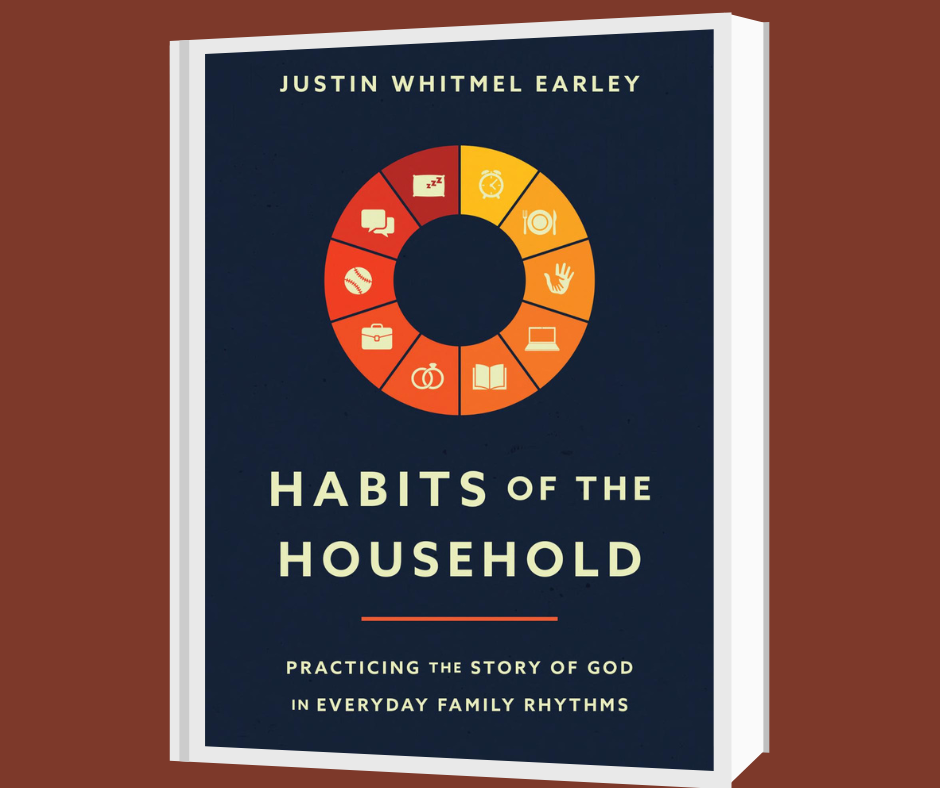Book Reviews
Habits of the Household: Practicing the Story of God in Everyday Family Rhythms, by Justin Whitmel Earley | Review by Rosa Byler

Every household develops patterns for basic everyday activities, whether by default or with intention. These eventually become so familiar that we don’t think about them unless we spend time in another household—or marry. As young parents soon discover, the arrival of children intensifies the urgency to establish helpful routines! Habits of the Household is a book that I wish we had had before bringing up our children and am recommending it to them as they bring up theirs. (It was also a book that I edited right on the page in several places; more on that later.)
Justin Earley, father of four boys, set out to improve his family’s habits after recognizing that tumultuous bedtimes were too often the norm. His efforts expanded into ten common categories of family routines: waking, mealtimes, discipline, screentime, family devotions, marriage, work, play, conversation, and bedtime, with a chapter for each. He begins each chapter with a story, explores the theology connected with the concept, provides tools for parents to use in building “grooves of grace” in ordinary situations, and ends with a summary of key concepts and a reminder of our need for God’s grace and love.
Earley states that “habits are kinds of liturgies…little routines of worship, and worship changes what we love.” (11) Many people associate liturgies with Latin chants and incense in high-ceilinged cathedrals; Earley uses the term intentionally. He explains that more spiritual formation (both good and bad) takes place in ordinary moments of life than during deliberate instruction or worship. The liturgies of American culture, for example, tend to form “anxiety-ridden, lonely, confused, and screen-addicted teenagers.” (16)
I found several of Earley’s categories particularly thought-provoking. While we regularly sat down together to eat, for example, mealtime has much more potential than I realized for working on character qualities: “delayed gratification” (in the passing of food); “spoken encouragement” (complimenting rather than criticizing the meal); forgiveness (in accidents and spills); and loyalty, “sticking around even when we don’t want to” (waiting to be excused).
Earley tells two stories in “Conversation.” In the first, as an older teen on a trip with his father, he longed to acknowledge his sins and struggles but was unsure whether or how to do it. One evening his father shared openly about his own difficulties as a young man, leading Earley himself to honest confessing of sin, seeking forgiveness, and asking for advice and wisdom. It was a significant turning point in his life.
The second story involves a swing accident to his three-year-old. Noting the child’s responses, Earley began to talk him through the event. From tears on the first two retellings to healthy “processing” by the fourth or fifth time, the child’s focus moved past the pain of the injury to form positive memories of being surrounded by family, helped by doctors, and coming home with a treat. (He got back onto the swing the next day and now smiles about his scars.) Earley concludes, “Conversation heals trauma.” Parents cannot always protect their children from pain but should identify it and converse toward repairing/redeeming the situation. Without mature guidance to tell the stories of his difficulties, a child will create his own version—and it can shape his life.
“Screentime” was just starting to affect family habits in our day; any parent who has set his child in front of a screen to buy solitary time for himself needs to read this chapter. “Family Devotions,” once a Christian home staple, merits a resurgence in practice. “Marriage,” the habit of covenant love, is “the great theme of Scripture” (135) but will be poorly represented unless we intentionally prioritize it. “Work” points out the spiritual dignity of both unpaid homemaking and formal employment. Young children can participate in household chores as well as learn how specific careers or vocations fulfill the creation mandate. “Play” also includes excellent suggestions for rhythms of sabbath, a weekly rest from routine work. All the other chapters are similarly worthwhile.
Nevertheless, I halted between two opinions about the book and consulted the S & T editor, who recommended disclaimers. One is the age of Earley’s children and his stage in life; he does acknowledge this and looks ahead as well as can be expected. Another is the writing style, which hints at the confident, almost brash perspective of a “millennial” (Earley tells his children that he will always be there to protect them [32]; no one can be sure of this. About work, he says “Just like God created the world, at work I get to create things, like…!” [160]…No, not quite.) There are several mentions of sharing wine or a cocktail with his wife or going out for drinks on date nights. And while Habits of the Household does not set out to be a parenting book and does not comment on spanking, readers will note the lengthy, complicated, and largely ineffective disciplinary methods common to non-spankers.
Do I still recommend Habits of the Household? Unquestionably, yes. Our own experiences and my observation of other families seem to indicate that far too much early household management just happens and can be self- and culture-guided rather than biblical. Given the availability of media, hardly anyone can consider himself sheltered from ungodly societal influences (as clearly seen in even culturally isolated Christians’ responses during COVID). Young people and especially young parents will benefit from the book; grandparents also can read it and (as I did) add a few red marks/comments before giving it to their children.